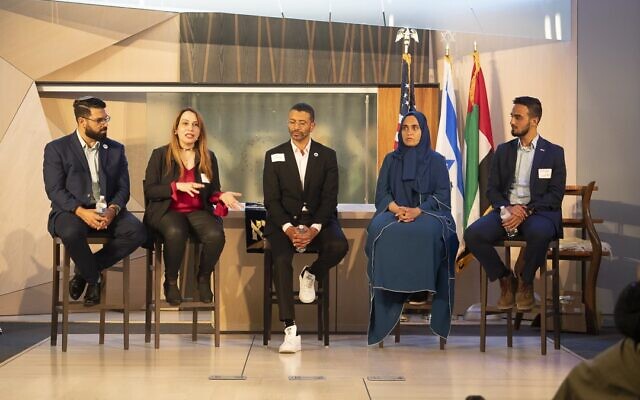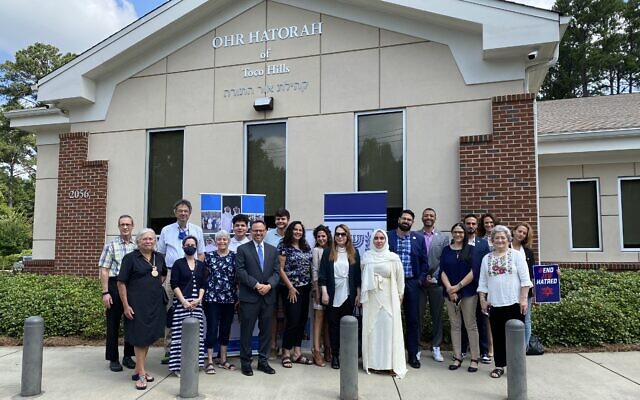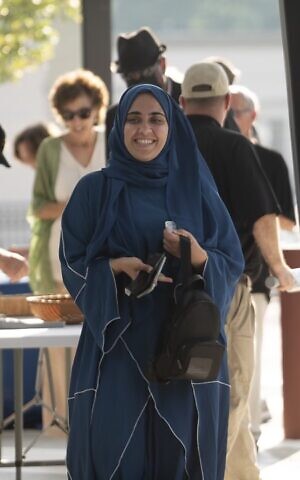Sharaka Delegation Discusses The Abraham Accords
The Sharaka delegation held conferences at Congregations Or Hadash and Ohr HaTorah touting the Middle East ‘partnership’ and its significance.

A delegation recently visited Atlanta from Sharaka, a non-governmental organization bringing diverse groups of influencers, activists and other leaders together to discuss The Abraham Accords, which promotes new relations between Israel, the United Arab Emirates and Bahrain.
The Sharaka delegation first appeared at Congregation Or Hadash in Sandy Springs on Aug. 4, hosted by the Consulate General of Israel to the Southeast, Jewish Federation of Greater Atlanta, Atlanta Rabbinical Association and Atlanta Israel Coalition. The next day, the delegation visited Congregation Ohr HaTorah, partnering with Congregation Beth Jacob for an exclusive roundtable conference hosted by Americans United with Israel, the Israel Consulate General, and synagogue members.
Ohr HaTorah Rabbi Adam Starr began the panel by explaining the word shalom and its usage in prayer and daily dialogue among people. Cheryl Dorchinsky, executive director of AUWI, founder of AIC and moderator for the day, then asked: “What exactly is the Abraham Accords?”
Omar Al Busaidy is the CEO of Sharaka, USA, but is from the UAE. He explained that it [Abraham Accords] is about exposing the diplomatic relationship among UAE, Bahrain, Morocco and Saudi Arabia. “Saudi Arabia just aired an interview with the Israeli-Saudi judo match players that took place during the Olympics. … that’s a big deal.” He added, “some people call it a love affair that was awaiting to blossom.”
Dr. Najat Al-Saied, a columnist and a professor in Zayed University in Dubai, said she believes today’s generation trust their social media and do not research further to gain the facts. She said she gives extra credit for students who can write thoroughly and publish pieces on diplomatic relationships such as arose from the Abraham Accords, such as diversity, individualism, coexistence, religion, culture and how to balance those with national identities.
Sumaiiah Almheiri, the cultural and social manager at Sharaka, said that “it’s okay to disagree. However, you must stay respectful, even if you condone what your counterpart is saying or doing.” She added that, “even within your family you can share differences and fight, so why can’t we treat one another like your family?”
Dan Feferman and Yahya Mahamid, Sharaka delegation members, admit that they have mass listeners and followers from hostile countries who want to learn about developing relationships with Israel. One messaged Mahamid asking, “How can I join the IDF?”

During the roundtable, one question raised was: “What’s the biggest thing that Jews and Arabs have to break in their mind [understand] in order to solve all indifferences?”
The panel unanimously agreed that it is imperative for both sides to understand how similar they are. “We are cousins. Our father is Abraham. …”
The main event at Or Hadash began with Rabbi Lauren Henderson singing “Hinei Ma Tov,” followed by Israeli Consul General Anat Sultan-Dadon stating that Israel continues to pursue peace. “It is still a work in progress but the achievement of our peace agreement with Egypt in ‘79 followed by the agreement with the Kingdom of Jordan in ‘94 was incredibly followed by the Abraham Accords last year. …”
Moderating the evening was Alexandria Shuval-Weiner, president of the Atlanta Rabbinical Association and senior rabbi at Temple Beth Tikvah. She began the event introducing the panel composed of five Sharaka delegation members. The panel started with Israeli peace activist Mahamid, who was raised in the Israeli city of Umm al- Fahm with a negative image of Israel until encountering a Chabad rabbi who asked him to shake the lulav and etrog during Sukkot.
Mahamid responded, “I’m not Jewish,” and the rabbi replied, “you don’t have to be Jewish; you just have to be a good person.” This was a pivotal moment for Mahamid that changed his perspective and life forever.
Next in line was Almheiri, who said that her passion for culture drew her to Sharaka, “which involves everyone and their individuality, that aligned with my values and what I see right.”
Busaidy explained that one of the reasons he joined Sharaka is his continuous communication with Israelis and Jews in Dubai. “The Abraham Accords did not surprise me when UAE normalized relationships with Israel since both countries have been talking for quite a while, having many delegations back and forth, discussing trade, cybersecurity, defense, diamonds, etc.” After advocating for the accords for quite some time, Sharaka offered him a position in the U.S. as a liaison. “I hope these accords will change the narrative in the region.”
Delegate Feferman is a former IDF intelligence officer who ended up forming The Gulf-Israel Policy Forum, a network of policy and influencers, which led to his travels to the UAE. “I was blown away by the people and ideology of this country, which I realized that is much like Israel in so many ways.”
Feferman focused on the importance of bridging the similar traditions and “looking into investing into technology and education.” He added that “the people in the Emirates are incredibly pragmatic, liberal and modern, nothing I had come to assume to expect of an Arab country in the Middle East.”
The last delegate, Al-Saied, teaches about media studies focusing on political communications in societal development. She said she puts emphasis on modernity in the Middle East. “By modernity I mean progression and development.” She said that after the Abraham Accords, she had opportunities landing in her lap to engage in a variety of international affairs that align with her vision of a true peace process.
Continuing with the panel, Shuval-Weiner quoted from Sharaka’s website, stating that since Sharaka means partnership, “a peace process is not complete unless it involves ordinary people. What is the idea of partnership and people-to-people peace? What does it mean and how does it manifest itself through things that you do individually?”

Feferman believes in the innate compatibility of individuals, affirming that, “unless children are brought up being educated about peace while getting to know one another, it is not going to happen.” He added that countries can sign many political treaties among themselves; however, if it isn’t taught within society, it’s almost impossible to achieve.
His colleague Busaidy agreed. “Miscommunication can be the root of all evil.” Meanwhile, extensive communication can solve many problems, he said. Al Saied had a different interpretation of attaining peace. “It doesn’t matter how many times we sign a piece of paper; it will never be a true peace if we don’t involve the people and [educate] them. Extremism will forever bring hostility upon individuals instead of [bringing] stability and prosperity. We need to use rationality rather than emotion.”
To acquaint the audience with the panel, Shuval-Weiner asked if Sharaka has seen an impact on the individual community level and if those differences were widened. Sharaka’s CEO Busaidy replied, “I think that some Americans are afraid that they might lose business after the accords, since the Emirates is now importing avocados from Israel.” He added that the label “from Israel” is on the avocados. He also mentioned the potential trade among the countries, adding that there is even kosher food and wine in stores. Stating that all parties’ countries in the accords, Arabs and Israelis will have a bilateral opportunity to learn more about each other while destroying that barrier of inopportunity from either side. Soon enough all countries will jump on the peace wagon and hate will become obsolete; hostility will eventually become an anachronism.
While Sharaka’s mission is new, Feferman believes that they are not there to tell governments how to operate, but rather, build a groundswell to spread ways of humanizing each other and not the contrary. The delegation tours around the U.S. with the intent to reach Europe and more Middle Eastern countries.
For more information about the delegation, visit www.sharakango.com.
- News
- Local
- Stephanie Nissani
- The Abraham Accords
- Israel
- United Arab Emirates
- Bahrain
- Morocco
- Dubai
- Saudi Arabia
- Israeli-Saudi Judo
- rabbi adam starr
- Cheryl Dorchinsky
- Omar Al Busaidy
- Sharaka USA
- Olympics
- Dr. Najat Al Saied
- Anat Sultan-Dadon
- Zayed University
- Sumaiiah Almeheiri
- Dan Feferman
- Yahya Mahamid
- IDF
- Rabbi Lauren Henderson
- Alexandria Shuval-Weiner
- Sukkot
- Mahamid
- lulav
- etrog
- Gulf-Israel Policy Forum
- Al Saied
- Middle East
- Kosher Foods
- Congregation Or Hadash
- Consulate General of Israel to the Southeast
- jewish federation of greater atlanta
- Israeli Consul
- Atlanta Rabbinical Association
- Atlanta Israel Coalition
- Congregation Ohr HaTorah
- Congregation Beth Jacob
- americans united with israel
- Israel Consulate General
- temple beth tikvah
- Egypt
- Jordan



comments